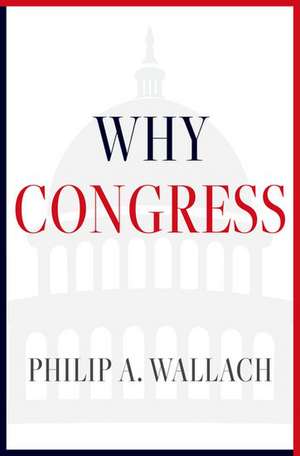Why Congress: Studies in Postwar American Political Development
Autor Philip A. Wallachen Limba Engleză Hardback – 30 aug 2023
Din seria Studies in Postwar American Political Development
- 11%
 Preț: 137.09 lei
Preț: 137.09 lei -
 Preț: 350.43 lei
Preț: 350.43 lei - 18%
 Preț: 173.19 lei
Preț: 173.19 lei -
 Preț: 238.83 lei
Preț: 238.83 lei -
 Preț: 316.91 lei
Preț: 316.91 lei - 5%
 Preț: 248.82 lei
Preț: 248.82 lei -
 Preț: 327.77 lei
Preț: 327.77 lei - 17%
 Preț: 153.62 lei
Preț: 153.62 lei - 19%
 Preț: 199.56 lei
Preț: 199.56 lei - 10%
 Preț: 189.18 lei
Preț: 189.18 lei -
 Preț: 399.19 lei
Preț: 399.19 lei - 13%
 Preț: 183.10 lei
Preț: 183.10 lei - 24%
 Preț: 174.95 lei
Preț: 174.95 lei - 14%
 Preț: 155.91 lei
Preț: 155.91 lei - 12%
 Preț: 136.27 lei
Preț: 136.27 lei - 13%
 Preț: 133.61 lei
Preț: 133.61 lei - 12%
 Preț: 159.47 lei
Preț: 159.47 lei - 24%
 Preț: 376.91 lei
Preț: 376.91 lei - 14%
 Preț: 265.32 lei
Preț: 265.32 lei - 16%
 Preț: 166.36 lei
Preț: 166.36 lei - 27%
 Preț: 384.65 lei
Preț: 384.65 lei - 12%
 Preț: 292.57 lei
Preț: 292.57 lei - 18%
 Preț: 135.64 lei
Preț: 135.64 lei - 27%
 Preț: 359.82 lei
Preț: 359.82 lei - 14%
 Preț: 260.44 lei
Preț: 260.44 lei - 14%
 Preț: 270.71 lei
Preț: 270.71 lei -
 Preț: 220.04 lei
Preț: 220.04 lei - 27%
 Preț: 322.06 lei
Preț: 322.06 lei - 9%
 Preț: 478.92 lei
Preț: 478.92 lei -
 Preț: 302.59 lei
Preț: 302.59 lei
Preț: 158.06 lei
Preț vechi: 179.49 lei
-12% Nou
Puncte Express: 237
Preț estimativ în valută:
30.25€ • 31.66$ • 25.17£
30.25€ • 31.66$ • 25.17£
Carte disponibilă
Livrare economică 26 februarie-04 martie
Livrare express 22-28 februarie pentru 54.10 lei
Preluare comenzi: 021 569.72.76
Specificații
ISBN-13: 9780197657874
ISBN-10: 0197657877
Pagini: 336
Dimensiuni: 229 x 163 x 48 mm
Greutate: 0.59 kg
Editura: Oxford University Press
Colecția OUP USA
Seria Studies in Postwar American Political Development
Locul publicării:New York, United States
ISBN-10: 0197657877
Pagini: 336
Dimensiuni: 229 x 163 x 48 mm
Greutate: 0.59 kg
Editura: Oxford University Press
Colecția OUP USA
Seria Studies in Postwar American Political Development
Locul publicării:New York, United States
Recenzii
With its historical analysis of Congress and insight into its potential future, this book will appeal to political science and public policy majors. A recommended purchase for academic libraries.
Nuanced and persuasive, this is a valuable reminder that Congress has risen to the moment before and can do so again.
Provides a compelling argument for the importance of our legislative branch and how it can reassert its relevance in the 21st century.
Why Congress is an excellent book that argues persuasively for the necessity of a thriving Congress in a diverse republic.
Why Congress is a well-researched, readable examination of Congress's ability and inability to deal with important policy issues, ranging from 1960s civil rights successes to more recent immigration failures.
Why Congress - no question mark, no subtitle - is perhaps the most important book on politics published in 2023.
Wallach's primary aim in this book is to reassess Congress's role in the political and policymaking process over the past several decades...Wallach is rightly concerned with the political relevance of a Congress that is both quick to centralize policymaking and deliberation within the leadership, while simultaneously delegating significant policymaking autonomy to the executive branch.
Nuanced and persuasive, this is a valuable reminder that Congress has risen to the moment before and can do so again.
Provides a compelling argument for the importance of our legislative branch and how it can reassert its relevance in the 21st century.
Why Congress is an excellent book that argues persuasively for the necessity of a thriving Congress in a diverse republic.
Why Congress is a well-researched, readable examination of Congress's ability and inability to deal with important policy issues, ranging from 1960s civil rights successes to more recent immigration failures.
Why Congress - no question mark, no subtitle - is perhaps the most important book on politics published in 2023.
Wallach's primary aim in this book is to reassess Congress's role in the political and policymaking process over the past several decades...Wallach is rightly concerned with the political relevance of a Congress that is both quick to centralize policymaking and deliberation within the leadership, while simultaneously delegating significant policymaking autonomy to the executive branch.
Notă biografică
Philip A. Wallach is a senior fellow at the American Enterprise Institute (AEI), where he studies America's separation of powers, with a focus on regulatory policy issues and the relationship between Congress and the administrative state.
